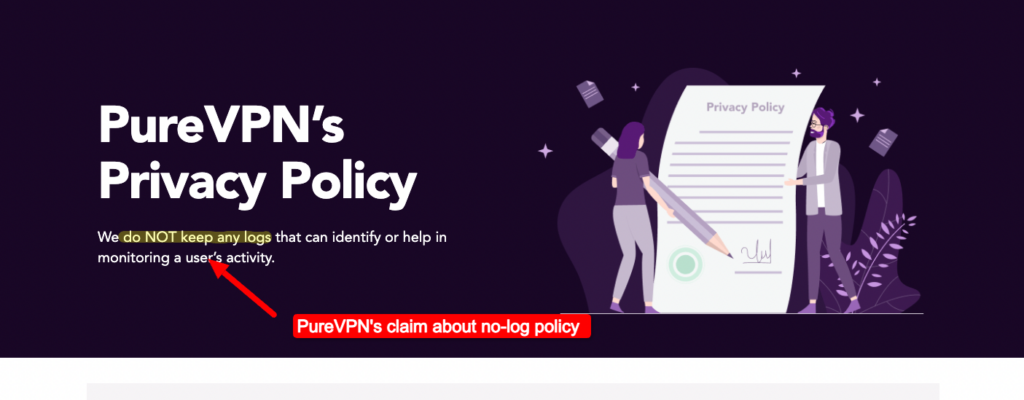Ahoy! A strict no-logs policy is important, right? Especially for streaming and torrenting fans like myself. Today, I’m diving deep into the world of PureVPN to investigate whether they keep logs and if they’re truly the reliable choice we’re all looking for. I’ll also discuss a notorious incident that may give some users pause and the groundbreaking step they’ve taken with KPMG to ensure transparency and trust. So, grab your eyepatch, and let’s set sail! And if you want to learn more about my PureVPN experience, check out my detailed breakdown of PureVPN features, pricing, and more. If you’re wondering if PureVPN does have a free trial, I’ve got you covered with a guide on how to get PureVPN for free.
PureVPN’s No-Logs Policy: Fact or Fiction?
PureVPN proudly boasts a strict no-logs policy, but let’s face it – we’ve all heard that one before, right? So, I put my investigative hat on and scoured their Privacy Policy to find out if they walk the walk.

Here’s the gist of what I found: PureVPN claims they do not keep any logs related to your browsing activities, connection timestamps, IP addresses, or original IPs. Essentially, they shouldn’t have any clue about what you’re up to online. Cue the secret agent music.
Independent Audits: The Moment of Truth
We all know actions speak louder than words, so I was thrilled to discover that PureVPN has undergone independent audits to verify their no-logs claims. In 2019, they enlisted Altius IT, a reputable US-based independent auditor, to inspect their systems and ensure they were indeed log-free. The results? PureVPN passed with flying colors! Insert applause here.
But that’s not all! PureVPN decided to up their game even further by partnering with KPMG, one of the Big Four auditing firms, for an “Always-On Audit.” This means KPMG can conduct a thorough surprise audit of PureVPN’s processes and servers at any time without prior notice. In October 2020, KPMG conducted their second audit under the Always-On Audit clause and confirmed that PureVPN holds true to its claim of a No-Log VPN service. You can read more about this groundbreaking initiative in this PureVPN blog post.
To better understand PureVPN’s commitment to privacy, it’s helpful to know more about the company’s background. If you’re curious about PureVPN ownership, I have an in-depth investigation on the topic for you to explore.
The Notorious Incident: PureVPN Logs and the FBI
You might be thinking, “But what about that notorious incident with PureVPN and the FBI?” Well, let me put on my storytelling hat and take you back to 2017. A man named Ryan Lin was arrested on cyberstalking charges after harassing and stalking a woman named Jennifer Smith (not her real name). Lin allegedly used VPNs, including PureVPN, to hide his identity while carrying out his nefarious activities.
The FBI got involved and managed to obtain logs from two VPN providers, PureVPN and WANSecurity. Shockingly, PureVPN’s logs helped the FBI link Lin’s real IP address to the harassing activity. This raised eyebrows since PureVPN claims not to keep logs. You can read more about the incident in this BleepingComputer article.
In response to the incident and the concerns it raised, PureVPN made significant changes to their logging policy and infrastructure. They doubled down on their commitment to privacy and ensured that their systems adhered to their no-logs claims.
The independent audits by Altius IT and the ongoing audits by KPMG are testaments to PureVPN’s dedication to upholding user privacy. By submitting themselves to these rigorous inspections, PureVPN aims to regain user trust and prove their commitment to providing a genuinely log-free service.
Conclusion: Can We Trust PureVPN?
So, after my in-depth investigation into PureVPN’s logging policies and practices, can we trust them with our online privacy? It’s clear that the company has taken major strides to improve its logging policies and ensure that they provide a truly log-free service. The independent audits by Altius IT and the ongoing Always-On Audit by KPMG are strong indicators that PureVPN is committed to user privacy and has learned from its past mistakes.
While the 2017 incident is undoubtedly concerning, the company’s transparency and willingness to undergo independent audits demonstrate that they’re working hard to regain the trust of the VPN community. With these improvements in place, I’m inclined to give PureVPN the benefit of the doubt and believe that they are now a trustworthy choice for users seeking a no-logs VPN service.
That being said, it’s essential to stay vigilant and keep an eye on any future developments. As always, I’ll be here to keep you informed and guide you through the ever-changing landscape of VPN privacy. Until next time, stay safe and private, fellow pirates!

